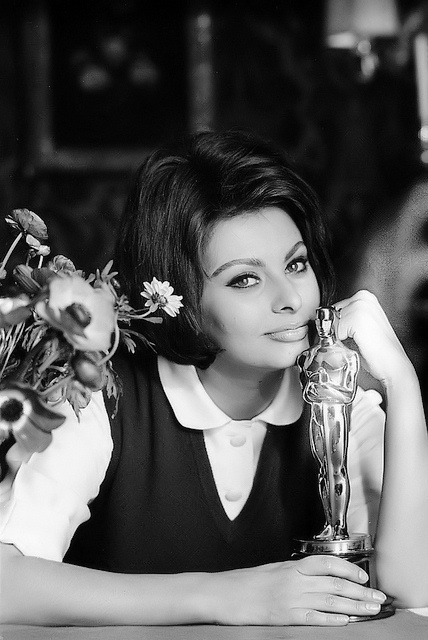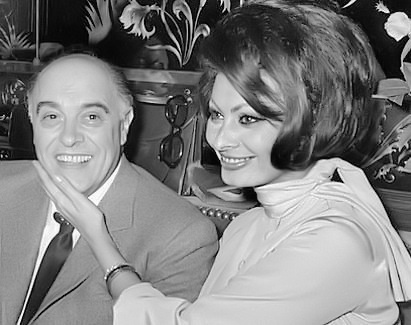|
1962, April 9th, Rome: Sophia Loren’s telephone rings at 6.40 a.m. and Cary Grant’s voice, from Hollywood says: «Darling, have you heard?» «Heard what?» "You won! You won the Oscar®!" The Academy Awards ceremony did not appear on Italian television, so Sophia had gone to bed, that night, certain that she had not won.
But she did, best Actress in a Leading role for Two women by Vittorio De Sica - a Carlo Ponti’s production. She faced Audrey Hepburn - Breakfast at Tiffany’s, Natalie Wood - Splendor in the Grass, Geraldine Page - Summer and Smok, and Piper Laurie - The Hustler.
Burt Lancaster said, on stage, the classic "and the winner is…Loren!" but actress Greer Garson received the Oscar® for Sophia: Loren wasn’t in Los Angeles but in Rome with her producer Ponti.
It was the first time that the Oscar® had been given to an actress in a foreign-language film and many reporters and photographs were at Ponti’s door early in the morning. The most popular Italian cinema’s journalist, Lello Bersani, was the first to reach them with cameras but Italian television stopped him: Sophia and her loved producer, in their housecoats and Sophia embracing Vittorio De Sica and Ponti uncorking a bottle of champagne, were a real scandal. They got married in Mexico but their union still had to be legally recognized in Italy.
Ponti was a legendary producer. Together or without the Italian tycoon Dino De Laurentiis he is the producer of , more or less, 150 films by the most important international directors: Vittorio De Sica, Federico Fellini, Michelangelo Antonioni, Jean-Luc Godard, David Lean, Roman Polanski...
His career became tied to that of Loren, who had roles in more than 30 movies he produced or co-produced.
Cinema Italian Style, between Italy and Los Angeles, has, in 2012, two special reasons to remember him: 50 years from the special day of Sophia Loren’s Oscar® and Ponti’s 100th birthday.
Two important anniversaries all over the (cinematographic) world....
Thank you, Mr.Ponti.
|

|
|

|
Carlo Ponti (1912-2007) has been one of the most prolific and influential Italian producers of all times. Born close to Milan, he combined commercial productions with visual masterpieces like "La strada" (winner of the Oscar® for Best Foreign Language Film in 1956) by Federico Fellini, "Marriage Italian Style" and "Yesterday, Today and Tomorrow" by Vittorio De Sica, Vidor’s "War and Peace", Godard’s "A Woman Is a Woman", "Blow up", "The passenger" and "Zabriskie Point" by Michelangelo Antonioni.
His vast body of work encompassed Italian realism and "Comedy Italian Style", French New Wave and Hollywood hits. In 1940 he produced "Piccolo Mondo Antico", by Mario Soldati, starring Alida Valli in her first notable role. In the following years, for the renowned production company Lux, he produced a long series of success movies featuring the Italian most famous comedian Totò.
He collaborated with Dino De Laurentiis from 1950 to 1957, then produced films independently.
"People talk about making art films — experimental films. I can make an art film every day of the week. Nothing to it. What’s difficult is to combine a commercial film with art."
In 1965 he produced his most popular and financially successful film, David Lean’s "Doctor Zhivago".
Passionate art collector, the works he was able to reach include masterpieces form Francis Bacon, Magritte, Picasso, Renoir, Braque, Dalì.
He had two children (Guendalina and Alessandro) from his first wife Giuliana Fiastri and two (Carlo and Edoardo) from his second wife, Sophia Loren, whom he discovered in 1950, building a lifelong relationship. For her role in the film he produced in 1962 "Two women" (La ciociara), Sophia Loren was the first actress to receive and Oscar ® as Best Actress in a non English spoken movie.
|